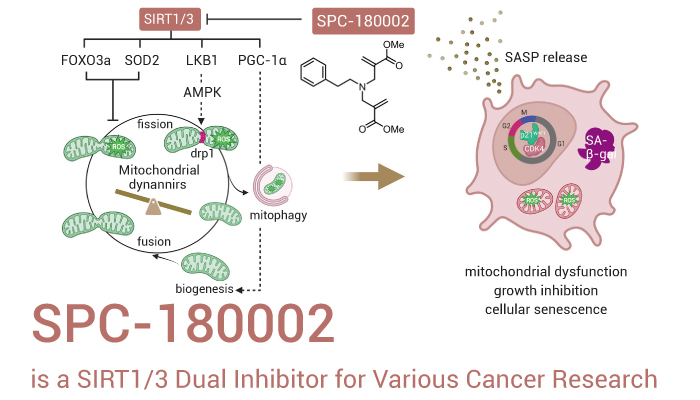Sirtuins (SIRT1-7) are members of nicotinamide adenine dinucleotidedependent deacetylases. Sirtuins play an important role in various biological processes, such as cellular redox signaling, cell cycle, senescence, DNA damage repair, apoptosis, energy homeostasis, and tumorigenesis. However, the roles of SIRTs in tumorigenesis are controversial, as they can be both tumor promoters and suppressors depending on the specific cellular conditions. SIRT2 and SIRT6 function as tumor suppressors, while SIRT1 and SIRT3 show oncogenic potential. Since SIRT1 and SIRT3 are highly expressed in various cancers and act as tumor promoters, the development of their dual inhibitors has emerged as a promising approach for anticancer treatment. Hence, we will introduce SPC-180002, a SIRT1/3 dual inhibitor.

SPC-180002 is a SIRT1/3 dual inhibitor, with IC50 values of 1.13 and 5.41 μM, respectively.
As study shows that the dual inhibition of SIRT1/3 by SPC-180002 disturbs redox homeostasis via ROS generation, which leads to an increase in both p21 protein stability and mitochondrial dysfunction.
SPC-180002 (0-5 μM, 24 h) inhibits cell cycle progression via p21 accumulation, which causes subsequent cellular senescence. Mechanically, SPC-180002 impairs mitochondrial function and redox homeostasis, thereby strongly inhibiting cell cycle progression and cancer cell growth. In addition, SPC-180002 ( 2-16 μM; 24 h) inhibits the growth of various cancer cells, such as KBV20C cells, MES-SA/Dx5 and MCF7/ADR cells.
SPC-180002 not only strongly suppresses the proliferation of cancer cells, but also exerts anticancer effect in vivo. For example, SPC-180002 (1-5 mg/kg, twice a week, i.p.) inhibits the growth of various cancer cells and impedes tumor growth in MCF7 tumor xenograft.
All in all, as a SIRT1/3 dual inhibitor, SPC-180002 may be an attractive candidate for anticancer drug development.
Reference:
[1] Cho Y, et al. Free Radic Biol Med. 2023 Aug 2;208:73-87.